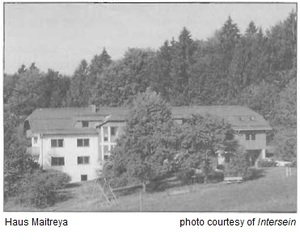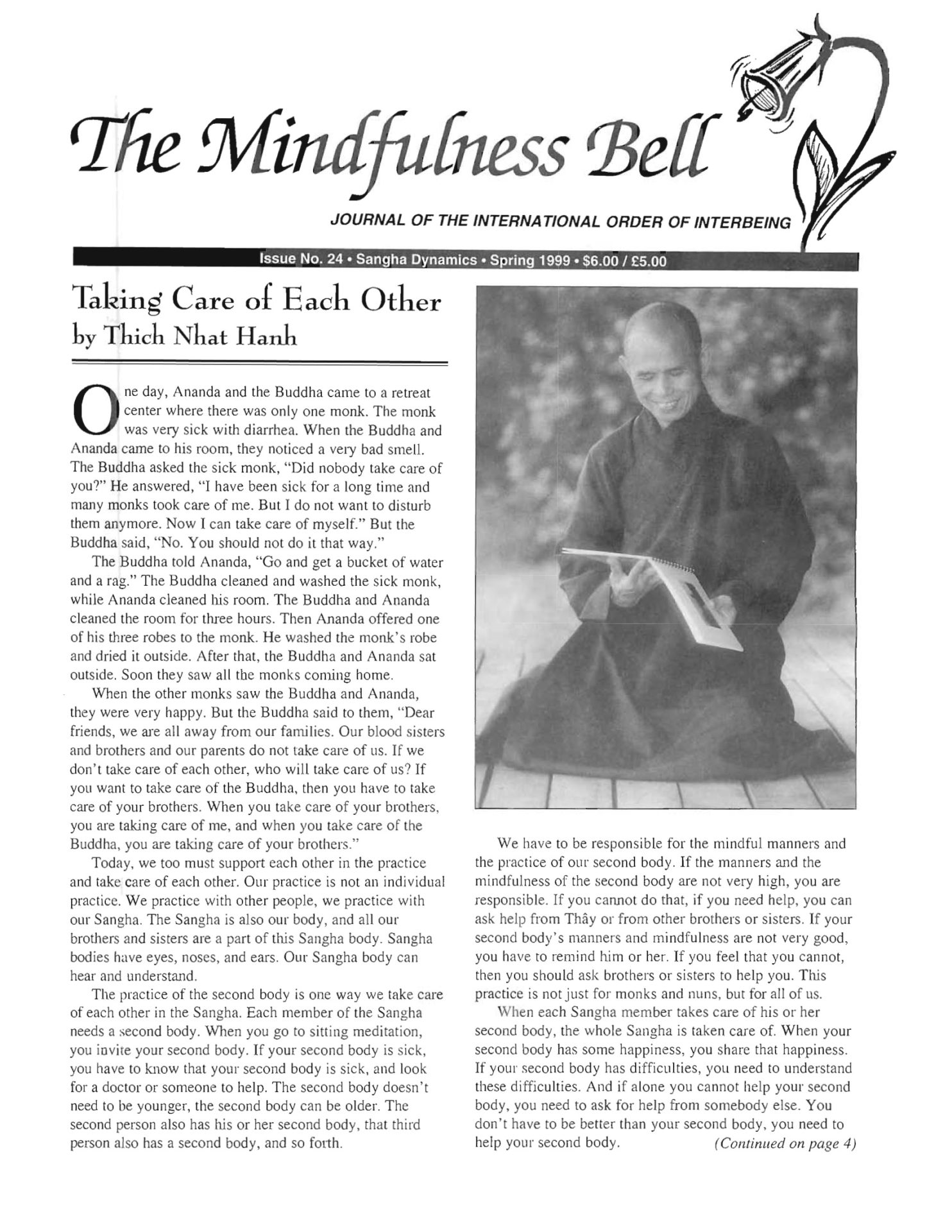By Karl and Helga Riedl
Sangha is some times defined as “the community that lives in harmony and awareness.” Community is one important aspect of a Sangha. Sangha can be a beautiful way to live with like-minded people, to share our responsibilities, happiness, and pains with friends in the Dharma. A Sangha supports our endeavor to live in awareness. We feel at home. We are nourished, and given the space and help to heal our wounds and transform our suffering.

But when we look deeper into Sangha,
By Karl and Helga Riedl
Sangha is some times defined as "the community that lives in harmony and awareness." Community is one important aspect of a Sangha. Sangha can be a beautiful way to live with like-minded people, to share our responsibilities, happiness, and pains with friends in the Dharma. A Sangha supports our endeavor to live in awareness. We feel at home. We are nourished, and given the space and help to heal our wounds and transform our suffering.

But when we look deeper into Sangha, when we are living in it for a longer time, we realize that the real aim of a Sangha is much more. It is the process-at times, quite demanding and challenging-of transforming our whole being. What looks like a lifestyle is actually the expression of a spiritual life. True Sangha offers an environment for spiritual growth-relaxed and gentle, but deep and thorough!
To build such a Sangha-and not just a community one needs to understand which "building blocks" are needed, look deeply into the ways a Sangha works, and be very aware which motivations the members ought to have. Out of our experience of living in the Plum Village Sangha for six years, we would like to share what we have found to be the main principles of a residential Sangha.
Commitment
True commitment reflects our deep aspiration to walk on the path of transformation and liberation, and to question the life we have led-with all our ideas, concepts, and desires- and the ways we secure our ego through wealth, fame, knowledge, and position. It is the heartfelt desire to submit ourselves to a life where "being" is more important than "having," where the loneliness of egoism and its restrictive ways of seeing and experiencing are opened up to others and to life as it presents itself. Commitment is the joyful willingness to let go of our concepts, to expose ourselves in the process of dissolving our existential ignorance and coming back to our true home.
Commitment means to being involved, not holding back anything. This is often seen as "giving up oneself' and accompanied with hesitation and fear. So it is safer, more familiar to us, to be a participant only, to basically keep our concepts and ideas and just add to that whatever feels "good" to us. Living in a Sangha is then seen as an opportunity to acquire new knowledge, to receive a training, and solve some personal psychological problems. We need to be aware of this pseudo-commitment.
Surrender
To let the process of transformation happen, we need to "surrender to the Sangha," as Thay has often emphasized. This is to surrender to the practice-wholeheartedly, with all our conviction and joy-and to surrender to the activities of the Sangha. Surrender is easily misunderstood as obeying or letting other people run our life. It is amazing to watch the Hydra of the ego come up at every possible occasion! Angels turn into rebels. "I do it my way!" "I need ... " Soon the first enthusiasm fades and we are looking for every possibility to take a leave from the practice. Even minor details and changes on the schedule evoke angry discussion. Surrender is the spiritual practice of setting aside our ideas and goals, and opening to new experiences, to all aspects of life, to the unknown-without opposing them. Its religious form is the prostration: bowing down, opening our hands, not holding back anything.
Serving
Another expression of surrender is serving the Sangha. Serving means doing what needs to be done- setting aside likes and dislikes, me and you. To serve is to overcome our habitual attitudes towards work and responsibilities and develop our concern, care, and love for others.
Serving happens when our initial idea "I am living in a Sangha" has changed into "I am living for the Sangha." But even then, there might be some selfish motivation; some personal hidden agendas may be the driving force for our actions. Serving then is misunderstood as taking on responsibilities.
Some people feel that they alone are able to do certain things, that they must take up the burden of a specific task or even of the whole community. In due time, they get burned-out and bitter. To rely on the Sangha, to step down from self-importance and accept one's own limits does not come easily for "the doer." When serving is misunderstood as assisting the Sangha with our skills, knowledge, and energy, then positions become fixed, and members of the community are judged by their "usefulness." True serving is to experience the reality of interbeing. Everybody actually supports everybody; there is neither dependence nor independence. It is then that we realize, "I am the Sangha."
Acceptance and Harmony
Another aspect of building a true Sangha is the willingness, even the heartfelt longing, to live in harmony with others. By cultivating our abilities to accept each other just as we are, we break through our spontaneous likes and dislikes, judgments and categorizing. We create an atmosphere of trust. Supported by the practice of deep listening and sharing, we develop a spirit of openness, where understanding grows into loving acceptance.
In our Western societies, where competition, jealousy, mistrust, and separateness prevail, their opposites-trust, acceptance, openness, and love-are deeply longed for, but it can be difficult to open to them. So it is easier to create a "pseudo-harmony"-where we are just "nice" to each other, where everybody seems to accept and love everybody-by not coming too close to each other, not touching anything that could disturb the peace and by closing off to those who do not "fit."
Humility and Respect
To greet the Buddha in each other is possible only when we have dissolved separateness and tackled the threefold complex of comparing ourselves with others-"I am better-equal-lower." Only then do we glimpse true humility-not putting ourselves down, but gracefully accepting that we need not be "somebody" or extraordinary. Ordinary is sufficient! We need not hold onto an image of ourselves or be caught in social status. If we give a Dharma talk, we sit on a platform, and if a driver is needed, we carry the luggage of a guest.
Now, from the depth of our being, we can show respect to ourselves and others. This respect is the foundation of a peaceful life. But, respect is not imposed on us as social hierarchy. We do not pay respect to a social position, but to a human being. We learn from others, follow their example, and listen to their advice, because we deeply honor and respect their having matured on the path. We accept others as "elders."

Again, in a society where competition and mistrust prevail, where everybody makes sure that nobody is "higher," even respect and trust are suspect. The "elder principle"-found in almost all spiritual traditions and at the core, a "maturity principle"-is rejected without any consideration. And that is an obstacle for building a spiritual community-a Sangha. Either a "pseudo-community" is created and maintained, or power games and "boss-hierarchy" consume all energy. Especially in Western societies we need to look deeply into this situation, and with the help of the Sangha, find ways to restore respect and based on that respect-the "elder-maturity-principle."
Each of these principles is in itself a door for entering the Sangha. As all these principles are interrelated, if one is practiced deeply, the others are strengthened. But if a Sangha member has a problem or a misunderstanding in even one area, the whole process of spiritual growth for the person-and to some extent for the whole Sangha-is disturbed, maybe even blocked. So it is important to be very clear about the working of a Sangha, to avoid disappointments and suffering and to build a harmonious and happy Sangha.
Dharma teachers Karl and Helga Riedl, True Communion and True Loving Kindness, recently moved to the newly established Intersein Zentrum in Germany. Please don't hesitate to contact them. Please write to receive an Intersein Zentrum schedule. Intersein Zentrum fur Leben in Achtsamkeit, Haus Maitreya, Unterkashof 2 1/3, 94545 Hohenau, Germany. They are very happy to share their experiences and insight.

